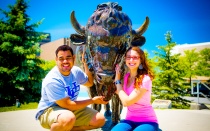Experiential Learning Opportunities

Graduate students have access to a wealth of exciting and practical opportunities for outside-the-classroom learning. These experiences foster networking and skill-building, whether within the student's concentration area, the university, or the Buffalo community at large.
Weekly Brown Bag Series
Faculty and students come together weekly for area meetings ("brown bags"): a forum for students, faculty and outside speakers to discuss ongoing research and professional development. These meetings provide a collegial context for stimulating thinking, widening intellectual exchange, and developing presentation skills.
Behavioral Neuroscience Program

- Students in the Behavioral Neuroscience graduate program have opportunities for learning in the laboratory, classroom, and community.
- Collaborative projects between the student’s primary lab and other labs on campus and at other institutes provide opportunities for diverse research experiences.
- The Buffalo Chapter of the Society for Neuroscience and the Neuroscience Graduate Student Association organize annual events during Brain Awareness week.
- Training in ethics is highly valued in our program. Research ethics training is completed as an ongoing series that is part of our weekly area meetings. Furthermore, students complete and maintain current certification in ethics and responsible conduct of research (through Collaborative Institutional Training Initiative and training provided by the Institutional Animal Care and Use Committee). Students who satisfactorily attend the weekly sessions and maintain proper certification receive a letter from the Area attesting to such training in research ethics.
Clinical Psychology Program

- Active involvement in clinical research, attendance at conferences and workshops, and presentation and publication of scientific results are expected outcomes for all students.
- The Clinical Psychology doctoral program has established strong research and clinical connections across the University and throughout the Buffalo community to create a vibrant intellectual environment. We have strong connections to Clinical and Research Institute on Addictions, Buffalo VA Medical Center, Buffalo General Hospital, Alberti Center on Bullying Prevention, Erie County Medical Center, Oishei Children’s Hospital, and Roswell Park Cancer Institute, as well as in the UB Departments of Psychiatry, Pediatrics, and School Psychology.
- Clinical training places a heavy emphasis on the scientific foundations of clinical psychology; students are trained to use empirically supported assessment and treatment practices. Clinical training occurs in the in-house Psychological Services Center.
- A wide range of advanced external practica, and optional lab-based clinical experiences are available at the Erie County Medical Center, Western New York VA, and the Erie County Holding Center.
Cognitive Psychology Program

- Students in the Cognitive Psychology graduate program will participate in weekly brownbags, can attend and present their work at local, national, and international conferences and workshops, and are expected to publish their results in scientific journals.
- Students engage in empirical research projects in their home laboratory, and are also expected to conduct a collaborative research project in a rotation laboratory within their first few years in the program.
- The Center for Cognitive Science hosts a Cognitive Science Colloquia series and the Distinguished Speakers in Cognitive Science series featuring internationally-recognized experts in cognitive science. These events provide a stimulating environment to engage with experts grappling with the major issues of the day facing cognitive science. All faculty and students from the cognitive psychology doctoral program attend these events.
- Graduate students can obtain a Certificate in Cognitive Science from the Center for Cognitive Science while completing their PhD in Cognitive Psychology. Please contact the Center to learn more.
Social-Personality Psychology Program

- Students progress in the program through a combination of mentored research activities, coursework and focused teaching opportunities.
- Students tailor their education to fit their own interests and professional goals through the selection of research projects and elective courses.
- Students engage in collaborative research with one or more faculty members throughout their graduate career. Each student has a major adviser who they meet with regularly to discuss progress and educational plans. As students progress, they are encouraged to take progressively greater responsibility for developing their own independent research programs.
- Students develop multiple aspects of their research skills by attending and presenting at weekly area brownbag meetings and regional and national professional conferences, all of which are attended by both students and program faculty. Publishing articles in professional journals, first as co-author with faculty mentors and eventually as primary author, further enhances skill development and establishes students’ identities as independent researchers in the field.
Advanced Certificate in Developmental Science
- Active involvement in developmental research in well-equipped faculty laboratories.
- The program draws on scientists across UB and throughout the Buffalo community to create a vibrant, multidisciplinary intellectual environment. Affiliated faculty are drawn from UB Departments of Psychology, Pediatrics, Learning and Instruction, Counseling, School and Educational Psychology, School of Nursing, School of Public Health and Health Professions, and the Alberti Center for Bullying Abuse Prevention.

